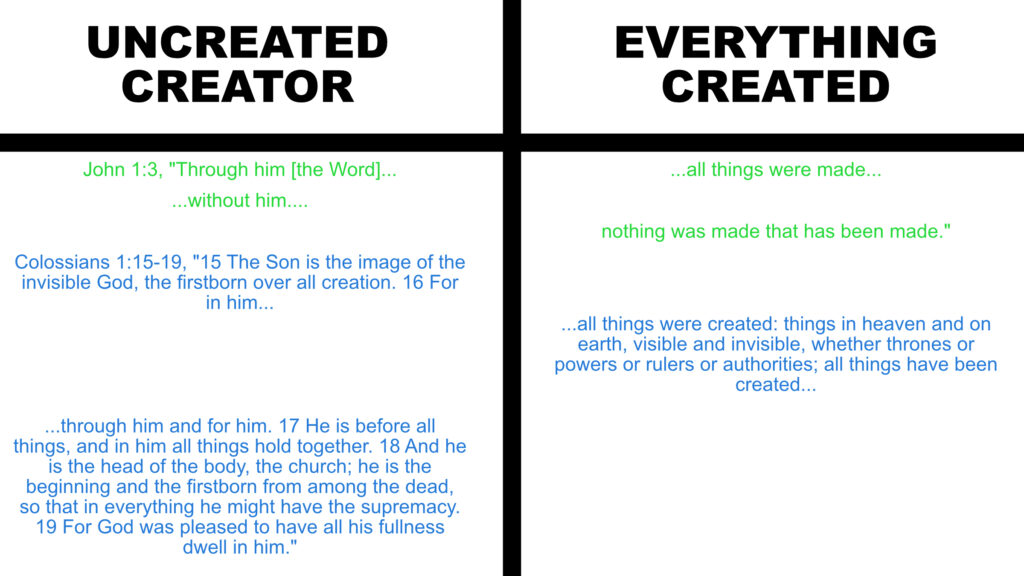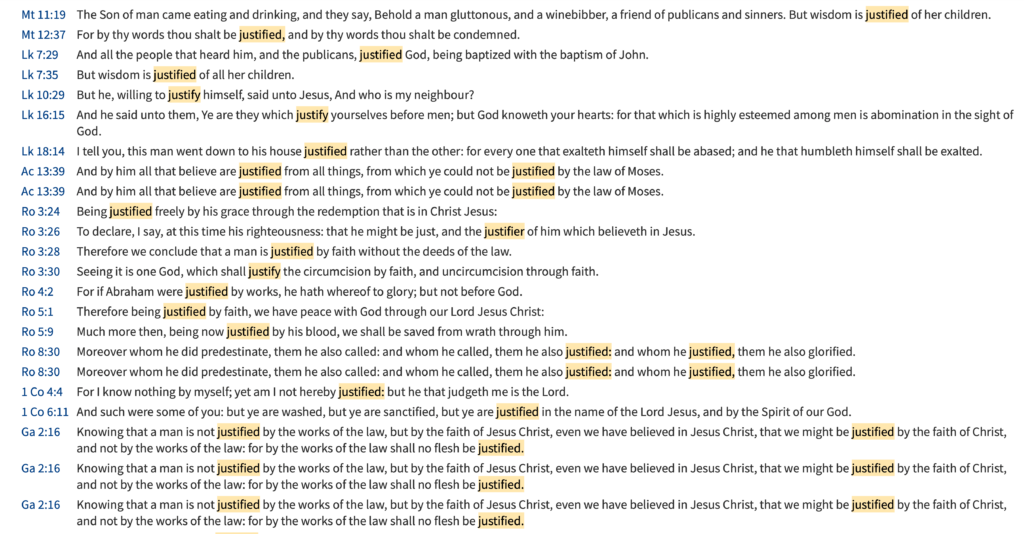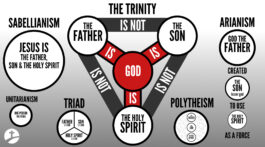The so-called black Hebrew Israelites need our patient help in instructing them on grace based salvation and the nature of God.
JOHN 1:1, ANSWERING ONENESS & ARIANISM
ONENESS: “In the beginning was the Word, and the Word was with God [the Father], and the Word was God [the Father].”
TRINITARIAN: “In the beginning was the Word, and the Word was with God [Father], and the Word was God [like the Father].”
ARIANISM: “In the beginning was the Word, and the Word was with God [Father], and the Word was [a] god.”
GREEK: (a) Ἐν ἀρχῇ ἦν ὁ λόγος, (b) καὶ ὁ λόγος ἦν πρὸς τὸν θεόν, (c) καὶ θεὸς ἦν ὁ λόγος.
THEOS IN CLAUSE C IS A PREDICATE NOMINATIVE: A predicate nominative (also called a predicate noun) is a word or group of words that completes a linking verb and renames the subject.
REBUTTING ONENESS: As can be seen in clause (c) “καὶ θεὸς ἦν ὁ λόγος,” there is no definite article before “θεὸς,” as is in the clause (b) “τὸν θεόν.” Therefore, “θεὸς” cannot be referring to a person and must be modifying the subject, “ὁ λόγος,” which has the article.
REBUTTING ARIANISM: Because clause (c) is anarthrous, without the article, it is incorrect to add an “a” before it because “θεὸς” is not the subject, “ὁ λόγος” is, and thus since “θεὸς” comes before “ὁ λόγος” it acts as a modifier to the subject’s quality.
FIRSTBORN & ONLY BEGOTTEN
Firstborn from Colossians 1:15-20 (NIV)
“15 The Son is the image of the invisible God, the firstborn [πρωτότοκος] over all creation. 16 For in him all things were created: things in heaven and on earth, visible and invisible, whether thrones or powers or rulers or authorities; all things have been created through him and for him. 17 He is before all things, and in him all things hold together. 18 And he is the head of the body, the church; he is the beginning and the firstborn from among the dead, so that in everything he might have the supremacy.
19 For God was pleased to have all his fullness dwell in him, 20 and through him to reconcile to himself all things, whether things on earth or things in heaven, by making peace through his blood, shed on the cross.”
Firstborn Doesn’t Always Mean First to be Born, But Rather Being Giving a Prominent Place: Jeremiah 31:9, “They will come with weeping; they will pray as I bring them back. I will lead them beside streams of water on a level path where they will not stumble, because I am Israel’s father, and Ephraim is my firstborn son.”
Only Begotten or One and Only from John 1:18 (NIV)
“No one has ever seen God, but the one and only Son, who is himself God [μονογενὴς θεὸς] and is in closest relationship with the Father, has made him known.”
Only Begotten Doesn’t Always Mean Only One Born, Rather it Can Be Used to Give Someone a Prominent Place: Hebrews 11:17-19 (KJV), “17 By faith Abraham, when he was tried, offered up Isaac: and he that had received the promises offered up his only begotten son [μονογενὴς], 18 Of whom it was said, That in Isaac shall thy seed be called: 19 Accounting that God was able to raise him up, even from the dead; from whence also he received him in a figure.”


INTRODUCTION
I want to take the position that, “Faith in Jesus + Nothing = Salvation.” In other words, “Salvation is by Faith Alone.
- FAITH: To trust in God.
- SALVATION: To be saved from God’s wrath.
SEVEN FOUNDATIONS THAT SUPPORT SALVATION BY FAITH ALONE
- The Necessity of Faith
- The Gift of Faith
- The Coming of Faith
- The Composition of Faith
- The Living Faith
- The Gospel and Faith
- The Result of Faith
(1) THE NECESSITY OF FAITH
Hebrews 11:6, “But without faith it is impossible to please him: for he that cometh to God must believe that he is, and that he is a rewarder of them that diligently seek him.”
- Faith is the foundation for pleasing God- everything that the heroes of faith did (as listed by Hebrews 11) was because of faith. The author writes, “By faith…” before each exploit signifying the preeminence of faith before works. Faith came first and then the works followed.
- Faith has a focus in two things, (i) God’s existence & (2) God’s good character (as revealed in Scripture).
(2) THE GIFT OF FAITH
Ephesians 2:8-10, “8 For by grace are ye saved through faith; and that not of yourselves: it is the gift of God: 9 Not of works, lest any man should boast. 10 For we are his workmanship, created in Christ Jesus unto good works, which God hath before ordained that we should walk in them.”
- Paul clearly states that the sinner is saved “by grace through faith” and declares that both the “grace” and the “faith” are the “gift of God.”
- Likewise, salvation is not dependent on man’s works because gifts are not counted as wages or something a person deserves. A gift represents the generosity of the one giving it.
- Once being saved the Christian is made God’s workmanship and created to do good works. The good works can only be done after the work of salvation has been done.
- The word “created” (like “saved”) is past tense, thus proving that salvation comes first as a definitive act and then a life time of ongoing works come next.
(3) THE COMING OF FAITH
Romans 10:17, “So then faith cometh by hearing, and hearing by the word of God.”
- Faith is not generated by human will or emotion. Faith comes from hearing the Word of God.
- When the Word of God is spoken the will of man is freed to choose God or remain in unbelief.
- Mankind is not responsible for giving themselves faith, however, we are responsible to choose faith once we have heard God’s Word.
(4) THE COMPOSITION OF FAITH
Hebrews 11:1, “Now faith is the substance of things hoped for, the evidence of things not seen.”
- Faith in the believer’s life becomes an actual substance and evidence in their soul.
- The Holy Spirit anchors their choice to follow God with a confirmative seal (Ephesians 1:13).
(5) THE LIVING FAITH
James 2:26, “For as the body without the spirit is dead, so faith without works is dead also.”
- James in the prior verses compares a dead (inactive) faith to a genuine (active) faith.
- The difference between a dead and alive faith is the works it brings forth (ex., “Abraham and Rahab’s faith based obedience to God”).
- James is not contradicting Paul but rather explaining to his readers that a true faith will produce good works (i.e., “obedience to Christ’s commands”), just like how Paul taught in Ephesians 2:8-10 that the one truly saved and created to be God’s workmanship will do good works.
- In other words, good works do not save us but rather show that we have been saved by faith.
(6) THE GOSPEL AND FAITH
Romans 1:16-17, “For I am not ashamed of the gospel of Christ: for it is the power of God unto salvation to every one that believeth; to the Jew first, and also to the Greek. 17 For therein is the righteousness of God revealed from faith to faith: as it is written, The just shall live by faith.”
- The gospel (the good news about Jesus’ death, burial, and resurrection) has power to bring salvation to everyone that believes (has faith).
- Not only does the gospel have power to save by faith but it also reveals the righteousness of God from “faith to faith.”
- Therefore, those who are just (in right standing with God) will continue to live by faith.
(7) THE RESULT OF FAITH
Romans 10:9-13, “9 That if thou shalt confess with thy mouth the Lord Jesus, and shalt believe in thine heart that God hath raised him from the dead, thou shalt be saved. 10 For with the heart man believeth unto righteousness; and with the mouth confession is made unto salvation. 11 For the scripture saith, Whosoever believeth on him shall not be ashamed. 12 For there is no difference between the Jew and the Greek: for the same Lord over all is rich unto all that call upon him. 13 For whosoever shall call upon the name of the Lord shall be saved.’”
- According to Paul the confession of the Lord Jesus from the mouth has to come from faith in the heart to be saved.
- The chronology of salvation is simple; first, a “with the heart man believes unto righteousness” (v. 10a) and then second, “with the mouth confession is made unto salvation” (v. 10b).
- Salvation comes the same to both the Jew and Greek (Gentile) in the New Covenant, “there is no difference… for the same Lord over all is rich unto all that call upon him.”
- Lastly, I encourage everyone, as Paul did 2,000 years ago, to call upon the Lord in faith to be saved.
SUMMARY
I believe in the salvation for all mankind is by faith alone (Romans 10:10).
FIVE QUESTIONS FOR THE OPPOSING VIEW
- If faith and works must be together to gain salvation, then please explain why Paul wrote in Ephesians 2:8-9, “For by grace are ye saved through faith; and that not of yourselves: it is the gift of God: Not of works, lest any man should boast?”
- If faith must have man’s works accompanied with it to gain salvation, than please explain why Paul wrote in Romans 10:10, “For with the heart man believeth unto righteousness?”
- If having faith in the gospel of Jesus is not enough to save then why did Paul say in Romans 1:16, “[the gospel of Christ]… is the power of God unto salvation to every one that believeth?”
- According to Paul in Romans 4:1-5,9-12 when was Abraham credited with righteousness- before or after circumcision; “for we say that faith was reckoned to Abraham for righteousness?”
- Lastly, from the words of Paul in Galatians 3:2, “Received ye the Spirit by the works of the law, or by the hearing of faith?”
EXTRA RESOURCES
- Further teaching (1, 2, & 3).
- Verses on justification by faith alone (1).
- Church fathers on salvation by faith alone (1).
- Evidence that all non-evangelical religions believe in works based salvation (Hinduism, Buddhism, Islam, Roman Catholicism, etc.) (1).
- Story of a works based legalistic nationalist cult that repented (1).
WORD STUDY ON JUSTIFIED








